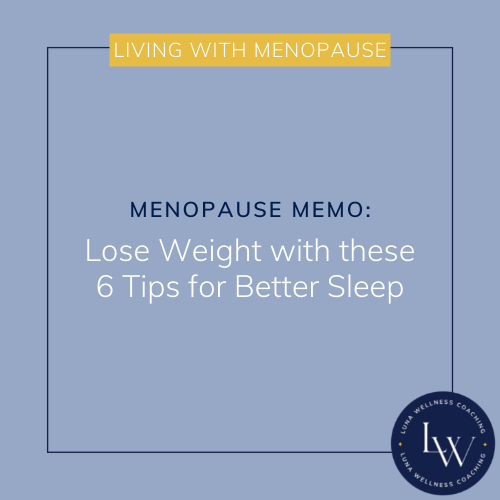Menopause Memo: Lose Weight With These 6 Tips For Better Sleep
5 minute read
Were you aware that hot flashes are not the only effects women experience during menopause?
I certainly wasn't until about 10 years ago when my sister went through menopause and struggled with almost a year of insomnia! It was a real eye-opener for me to discover how menopause can disrupt sleep and subsequently affect weight.
In this blog, I want to dive deeper into the connection between menopause, weight loss, and sleep. Additionally, I'll share six tips that will help you achieve better sleep, supporting your journey towards successful weight loss.
Does Menopause Really Affect My Weight?
Menopause is a significant phase of change for our bodies, much like puberty. During menopause, several aspects undergo a transformation:
Metabolism: Your metabolism is likely to slow down.
Physical activity: You may lack the energy or motivation to be as active as before.
Weight: Gaining weight quickly becomes common, and shedding those extra pounds becomes more challenging.
If you're experiencing some of these symptoms, you might feel discouraged and believe that losing weight is an impossible task. However, it's important to consider another factor that plays a role during menopause—sleep.
Lack of Sleep During Menopause Sabotages Weight Loss
Quality sleep is essential for everyone, with most people needing at least 7 hours of sleep each night. While some women have no trouble achieving this, many others struggle due to the effects of menopause on their bodies.
Why does menopause disrupt sleep? As we go through menopause, certain hormones, like estrogen, decline, leading to sleep disturbances. In addition, symptoms such as hot flashes, night sweats, and anxiety about experiencing another sleepless night can keep you awake.
When your body doesn't get enough sleep, it seeks ways to stay awake during the day, often resulting in cravings for sugary foods or carbs. The theory is that carbohydrates and sugar provide a quick energy boost as they are rapidly absorbed into the bloodstream. You may have already experienced this phenomenon. Have you ever noticed that after a carb-heavy lunch, you initially feel energized but become extremely tired and struggle to keep your eyes open by 3 pm?
This vicious cycle can wreak havoc on your waistline and overall health. Your body craves carbs to stay awake during the day, but at night, menopause and anxiety make it difficult to fall asleep.
Let's Prioritize Good Sleep with These 6 Tips:
When it comes to understanding how the lack of sleep during menopause affects weight loss, there's no one-size-fits-all solution for women. However, I've compiled six tips to help you establish a better sleep routine, providing a great starting point to find what works best for you.
✦ TIP #1: Exercise daily
I might sound like a broken record to those who know me, but I can't stress it enough—exercise is key.
If you haven't exercised in a while, start with small steps. For example, go for a daily 15-minute walk in the first week and gradually increase it by 5 minutes or more each week. If you've already been exercising, but need an extra push, try mixing up your routine with weight training, yoga, speed walking, dancing, biking, or using the elliptical machine.
Exercise positively impacts appetite by reducing ghrelin levels (the hunger hormone) and increasing peptide levels (a hormone associated with feeling satisfied and full).
✦ TIP #2: Create a bedtime routine and stick to it
Develop a bedtime routine that begins one hour before your intended sleep time. I didn't truly appreciate the value of a bedtime routine until I became a parent. Seeing how my son's mood and well-being were affected by not getting enough sleep on a predictable schedule made me realize its importance. Here are some ideas to incorporate into your bedtime routine:
Disconnect from all electronic devices (cellphones, iPads, laptops) one hour before bedtime. The blue light of electronic screens mimics the tone of the morning sun and tells your brain that it’s still daytime! This is why screen time messes around with your circadian rhythm.
Utilize essential oils and a diffuser—lavender is my personal favorite because I like the scent, but also because the natural chemical components reduce anxiety and have a sedative effect. The aromas of Ylang Ylang, Chamomile, and Peppermint are also known for bedtime wind-down properties. Find one you like and apply a drop to your temple and wrists. This will tell your body it’s safe, and therefore your parasympathetic nervous system (PSNS) will activate – this is the “rest, digest, and heal” control center.
Wear light, breathable cotton pajamas to help regulate your body temperature.
Use a journal or notebook to jot down your thoughts and worries, preventing them from keeping you awake. I like to call this a "brain dump." Putting your concerns into writing allows you to set them aside until the next day, giving your mind a rest.
Take a soothing shower before bed, incorporating essential oils to enhance relaxation.
You may also want to try a bedtime supplement of magnesium bisglycinate 20 minutes before bed. Magnesium turns on your PSNS because it relaxes muscles and is a great remedy for restless legs – which many women in menopause struggle with. Consult with your physician before starting any new supplements.
✦ TIP #3: Focus on healthy foods and lighter meals
Opting for lighter, nutrient-rich meals throughout the day, including dinner, can help avoid the unpleasant sensation of bloating that often follows a heavy meal.
It's worth noting that specific foods have been known to trigger hot flashes. If you're currently experiencing hot flashes, keeping a food log can be a helpful strategy for identifying potential triggers. Some foods commonly associated with triggering hot flashes include spicy dishes, caffeine, alcohol, sugary treats, processed foods, and foods high in sodium.
By tracking your diet and monitoring how these foods affect your symptoms, you can make informed decisions about your meals and potentially reduce the frequency or intensity of hot flashes.
✦ TIP #4: Practice stress management
Engaging in meditation for as little as 5 minutes a day can significantly reduce stress levels and promote better sleep. The practice of meditation allows you to quiet the mind, focus on your breath, and let go of racing thoughts, helping to alleviate stress and anxiety.
Yoga, another fantastic stress management technique, combines physical movement with deep breathing and mindfulness. By practicing yoga regularly, you can release tension from the body, calm the mind, and promote relaxation.
Incorporating these stress management techniques into your daily routine can create a peaceful mental state, paving the way for a restful and rejuvenating sleep.
✦ TIP #5: Reduce or remove disruptive substances
Avoid consuming nicotine, caffeine, and alcohol in the late afternoon and early evening to promote better sleep. These substances can have a significant impact on your sleep quality and disrupt your natural sleep patterns. Nicotine, often found in cigarettes and other tobacco products, is a stimulant that can interfere with falling asleep and result in fragmented sleep throughout the night.
Caffeine, commonly found in coffee, tea, energy drinks, and chocolate, is a powerful stimulant that can keep you awake and make it challenging to achieve deep sleep. Alcohol, while initially inducing drowsiness, can disrupt the later stages of sleep, leading to frequent awakenings and a less restorative rest. By minimizing or eliminating these substances in the hours leading up to bedtime, you can create a more conducive environment for a peaceful and uninterrupted night's sleep.
✦ TIP #6: Follow a regular sleep schedule
Your body has a natural circadian rhythm that signals when it's time to go to bed and wake up. Maintaining a consistent sleep schedule can greatly contribute to better sleep quality. Inconsistent bedtimes, fluctuating from 10 pm to 1 am, can disrupt your circadian rhythm and result in inadequate sleep.
By establishing a regular sleep routine and adhering to a consistent bedtime, you align your body's internal clock, allowing it to anticipate and prepare for rest at the appropriate time. This helps promote deeper and more restorative sleep, ensuring that you wake up feeling refreshed and energized.
Good Sleep Habits and Two Hormone Helpers
Getting sufficient, high-quality sleep is crucial in any weight loss plan, particularly during menopause. Just like moving our bodies and nourishing them, a good night's sleep allows us to rest and reset, ensuring we have the energy needed for daily exercise. Regular physical activity, in turn, has a profound impact on the regulation of two important hormones: ghrelin and leptin.
Ghrelin, often called the "hunger hormone," stimulates our appetite. When ghrelin levels are high, we tend to experience increased cravings and a stronger drive to eat. On the other hand, leptin, known as the "satiety hormone," is responsible for signaling fullness and reducing hunger. It conveys to our brain that we have consumed enough food, helping to control our eating habits.
A lack of sleep can disrupt the delicate balance of these hormones. When we don't get enough sleep, ghrelin production increases, leading to heightened feelings of hunger and stronger urges to eat. Simultaneously, leptin production decreases, diminishing our ability to recognize when we are full, potentially leading to overeating or poor food choices.
This disruption in the regulation of ghrelin and leptin due to insufficient sleep can significantly contribute to weight gain. It exemplifies why cultivating good sleep habits is a valuable asset in supporting weight loss efforts, regardless of whether you are experiencing menopause or not.
Remember, sleep is not a luxury but a necessity. So please give these tips a try to see how they can assist you. We're addressing emotional, mental, and physical needs in tackling your weight loss challenges. While losing weight may be your primary goal, it's crucial to examine some of the underlying causes that may contribute to weight gain.
If you want to learn more tips, join and take advantage of my 5-Day Challenge, Loving Your Way Through Menopause! Over the course of five days, you will receive helpful and effective advice. It's important to note that the focus goes beyond dietary recommendations and exercise routines. There are other factors that come into play that are connected to your sleep and weight loss, taking from a saying from American-born Chinese, “Everything is more connected than you think.”
Wouldn’t you want to know?
Have a Wellness Day!



